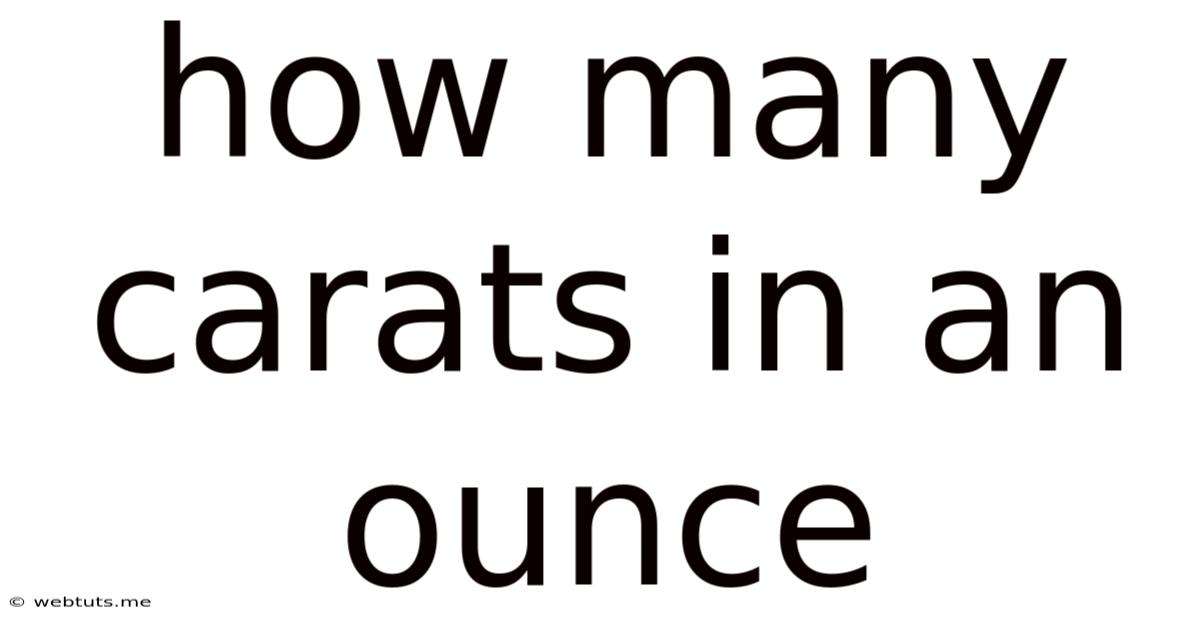How Many Carats In An Ounce
Webtuts
May 09, 2025 · 4 min read

Table of Contents
How Many Carats in an Ounce? A Comprehensive Guide to Carat Weight
Understanding the relationship between carats and ounces is crucial for anyone working with gemstones or precious metals. While seemingly simple, the conversion isn't straightforward due to the different systems of measurement involved. This comprehensive guide will delve into the intricacies of carat weight, ounce weight, and the conversion process, clarifying common misconceptions and providing practical examples.
Understanding Carats and Ounces: Different Units, Different Systems
Before we jump into the conversion, let's clarify the units themselves.
The Carat: A Unit of Mass for Gemstones
The carat, denoted as ct, is a unit of mass primarily used to weigh gemstones and precious metals. Historically, the carat's weight varied regionally, but it's now universally standardized as 200 milligrams (mg). This means one carat equals 0.2 grams (g). The term "carat" is derived from the carob seed, which was historically used as a weight reference due to its relatively uniform size. The use of carats ensures precision and consistency in gemstone grading and pricing.
The Ounce: A Unit of Mass in the Imperial and US Customary Systems
The ounce (oz) is a unit of mass used in the imperial and US customary systems of measurement. There are two main types of ounces:
- Troy ounce: Primarily used for precious metals like gold, silver, and platinum. One troy ounce equals 31.1034768 grams (g).
- Avoirdupois ounce: The more common type of ounce, used for most everyday items. One avoirdupois ounce equals approximately 28.3495 grams (g).
The distinction between troy and avoirdupois ounces is critical when converting between carats and ounces, especially in the context of precious metals. Using the wrong type of ounce will lead to significant inaccuracies.
Converting Carats to Ounces: The Calculation and its Nuances
Now that we've defined our units, let's tackle the conversion. The process involves a two-step conversion: carats to grams, and then grams to ounces.
Converting Carats to Grams
Since one carat equals 200 mg (or 0.2 g), the conversion from carats to grams is straightforward:
Grams = Carats * 0.2
For example, 10 carats would equal 10 * 0.2 = 2 grams.
Converting Grams to Troy Ounces (for Precious Metals)
The conversion from grams to troy ounces is equally simple:
Troy Ounces = Grams / 31.1034768
Using our 10-carat (2-gram) example: 2 grams / 31.1034768 grams/troy ounce ≈ 0.0643 troy ounces.
Converting Grams to Avoirdupois Ounces (for Other Applications)
For non-precious metal applications, the conversion uses the avoirdupois ounce:
Avoirdupois Ounces = Grams / 28.3495
Using the same 2-gram example: 2 grams / 28.3495 grams/avoirdupois ounce ≈ 0.0705 avoirdupois ounces.
Practical Examples: Illustrating the Conversion
Let's work through a few more practical examples to solidify the conversion process:
Example 1: A 5-carat diamond
- Carats to grams: 5 carats * 0.2 g/carat = 1 gram
- Grams to troy ounces: 1 gram / 31.1034768 g/troy ounce ≈ 0.0321 troy ounces
Example 2: A 20-gram gold nugget
- Grams to troy ounces: 20 grams / 31.1034768 g/troy ounce ≈ 0.643 troy ounces
- Troy ounces to carats: 0.643 troy ounces * 31.1034768 g/troy ounce = 20 grams
- Grams to carats: 20 grams / 0.2 g/carat = 100 carats
Example 3: A 100-carat gemstone
- Carats to grams: 100 carats * 0.2 g/carat = 20 grams
- Grams to troy ounces: 20 grams / 31.1034768 g/troy ounce ≈ 0.643 troy ounces
Common Mistakes to Avoid
Several common mistakes can lead to inaccurate conversions. These include:
- Confusing troy and avoirdupois ounces: Always ensure you're using the correct type of ounce based on the context (precious metals usually use troy ounces).
- Incorrect decimal placement: Pay close attention to decimal points during calculations to avoid significant errors.
- Rounding errors: While rounding is sometimes necessary, try to minimize it to maintain accuracy. Use as many decimal places as possible during your calculations before rounding to your final answer.
Beyond the Basics: Applications and Implications
Understanding carat-ounce conversion has several practical applications beyond simple calculations:
- Gemstone valuation: Carat weight is a major factor in determining a gemstone's value. Knowing the weight in ounces can help compare the value across different sizes of gemstones.
- Precious metal trading: The troy ounce is the standard unit for trading precious metals, so converting carat weights to troy ounces is essential for accurate pricing and trading.
- Jewelry design and manufacturing: Jewelers need to accurately calculate the weight of metals and gemstones to create precise designs and manage inventory.
- Geological and scientific research: Carat-ounce conversion might be necessary for analyzing the composition and mass of minerals and other geological samples.
Conclusion: Mastering Carat-Ounce Conversions
Mastering the conversion between carats and ounces requires a clear understanding of the different units of mass involved, particularly the distinction between troy and avoirdupois ounces. By following the steps outlined in this guide and paying attention to potential pitfalls, you can accurately convert between carats and ounces, ensuring precision in various applications related to gemstones and precious metals. Remember, accuracy is paramount, so always double-check your calculations and choose the appropriate ounce system for your specific needs. This understanding will empower you to navigate the world of gemstones and precious metals with confidence and precision.
Latest Posts
Latest Posts
-
Ben Shelton Loves Tnts French Open Coverage
Jun 01, 2025
-
Siakams Awkward Exchange A Pacers Clark Controversy
Jun 01, 2025
-
Okc Thunders Playoff Blowouts Four Key Factors
Jun 01, 2025
-
Vanessa Kirbys Quantum Physics Obsession
Jun 01, 2025
-
Ufc 317 Topuria Vs Oliveira Poster Unveiled
Jun 01, 2025
Related Post
Thank you for visiting our website which covers about How Many Carats In An Ounce . We hope the information provided has been useful to you. Feel free to contact us if you have any questions or need further assistance. See you next time and don't miss to bookmark.